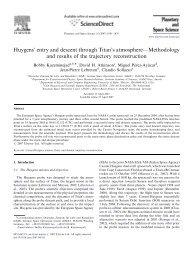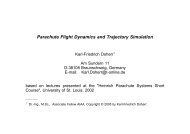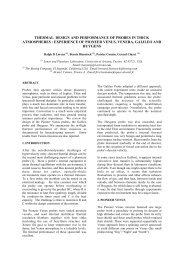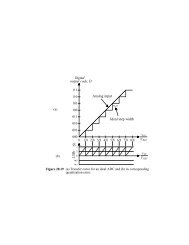Autobiography of a Maquoketa Boy-2.pdf - Microelectronics ...
Autobiography of a Maquoketa Boy-2.pdf - Microelectronics ...
Autobiography of a Maquoketa Boy-2.pdf - Microelectronics ...
You also want an ePaper? Increase the reach of your titles
YUMPU automatically turns print PDFs into web optimized ePapers that Google loves.
<strong>Autobiography</strong> <strong>of</strong> a <strong>Maquoketa</strong> <strong>Boy</strong><br />
Richard B. Wells<br />
That was the situation one night when I had just gotten up to go <strong>of</strong>f somewhere and screw around. Don<br />
looked up from his desk and snapped at me, “Don’t you have a physics test tomorrow?” I did, but I hadn’t<br />
told either <strong>of</strong> them that. I don’t know how Don knew about it. I acknowledged it, and Don said, “Then<br />
don’t you think you ought to be studying for it? How do you expect to get a decent grade if you don’t<br />
study?”<br />
I made the mistake <strong>of</strong> waving him <strong>of</strong>f with a laconic, “Grades don’t matter.”<br />
You’d have thought I’d insulted his mother. Don sprang out <strong>of</strong> his chair like a Jack in the Box, shoved<br />
his face right up in mine, and started reading me the riot act. I’m not that big, but Don was even shorter<br />
than I am and it gave the whole thing kind <strong>of</strong> a funny-but-serious air. I didn’t get a word in edgewise. Don<br />
threw one question at me after another, answering each one himself before I could even open my mouth.<br />
“What are you studying? Engineering! What do engineers do? They solve problems! What do you think<br />
your grades are? They’re an indication <strong>of</strong> how well you solve problems!” All the while he was doing this,<br />
he was waving his arms like Leo Durocher arguing with an umpire. If anybody else had yelled at me like<br />
that I’d have gotten madder than heck. But somehow, with Don, I didn’t feel angry at all. The more I<br />
listened, the more sense it all made. I actually started grinning, and the more sense it made the more I had<br />
to grin. He was completely, totally right. It hadn’t even occurred to me that when it came time to look for<br />
my first engineering job companies were going to go right to my GPA and look at it first thing. I hadn’t<br />
had the first clue that low grades would block me from getting into graduate school. I was screwing up<br />
badly and, even worse, I hadn’t even known I was screwing up.<br />
Don turned me around completely that night. I began watching how he studied and started trying to<br />
copy how he did it. I wouldn’t take a break unless Don took one. I also slowly figured out that, so far as<br />
those eight o’clock classes went – it was physics that quarter – I was going to have to find some way to<br />
stay awake in them or I was going to flunk out <strong>of</strong> this place. My solution to that problem turned out to be<br />
No Doz, the little caffeine pills they sell over-the-counter. I wouldn’t use them to stay up at night; I used<br />
them to stay awake in lecture. Eventually I was able to condition myself to staying awake, regardless <strong>of</strong><br />
how droning the pr<strong>of</strong>essor’s voice was, and didn’t need them anymore. It was already too late to salvage<br />
much <strong>of</strong> my grades that quarter; I got a 2.73. But the third quarter I pulled in a 3.67 – which boosted my<br />
cumulative GPA all the way up to a 3.02 – and never got less than a 3.43 ever after that. When I<br />
graduated, my cumulative GPA was 3.53, high enough to graduate with distinction. I owe that to Don.<br />
The biggest event on television in the winter <strong>of</strong> 1972 – so far as eighteen year old males were<br />
concerned –was the draft lottery. I gathered along with my pledge brothers on February 2nd to discover<br />
what our fates were going to be. Only the other Rick, Rick Lyons, wasn’t personally concerned how it<br />
came out. He was in Navy ROTC, intended to stay in ROTC, and go on to service in the Navy after he<br />
graduated. As an ROTC cadet, he had a student deferment from the draft. Although all <strong>of</strong> us were<br />
classified as 2S (college student), Nixon had canceled student deferments some time earlier for all college<br />
students except those in ROTC, and all the rest <strong>of</strong> us were eligible to be drafted.<br />
Everybody knew the days <strong>of</strong> the draft were numbered. The end-the-draft movement was having an<br />
effect and in 1971 a senator, Mike Gravel, had filibustered against renewing the draft. What none <strong>of</strong> us<br />
knew yet was just exactly when it would end. It was widely expected that this draft lottery was going to<br />
be the very last one, and just as widely expected that meant my age group – those born in 1953 – would<br />
be the last group who would ever be drafted. After all, why would they hold a lottery if they didn’t expect<br />
to use it? The most optimistic estimate was they would draft only about the first thirty-five numbers; the<br />
most pessimistic was that Nixon would find some way to keep the war and the draft going. Pretty much<br />
only the diehard radicals thought the latter, but none <strong>of</strong> us expected the draft to actually end as soon as it<br />
eventually did. We were all certain numbers one through thirty-five were goners for sure.<br />
I had done a lot <strong>of</strong> agonized soul searching about what I was going to do personally if my number was<br />
called up. In the summer <strong>of</strong> ’70, when I was sixteen and before I knew the extent <strong>of</strong> the army’s My Lai<br />
cover-up, before I knew only one man would ever stand trial for it, before I knew even that man would be<br />
143









